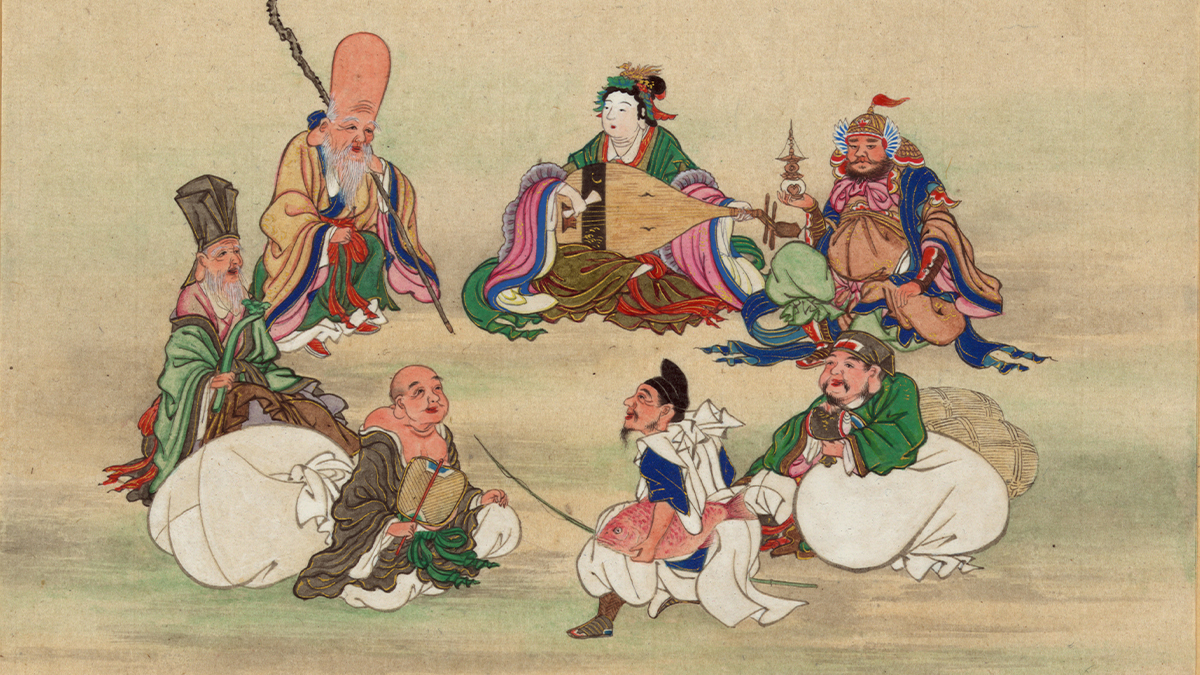Noragami is an anime based on the manga of the same name by Adachitoka, the name given to the female illustrator/writer partnership between Adachi and Tokashiki. Noragami literally translates to “stray god”, and though it follows the story of said stray god, it also introduces us to many others, all of which are based on real-world deities which are often revered in Japan, one of which is Bishamon.
Bishamon in Japanese mythology
Japan is a land made up of mythology and deities as the country combines Buddhism brought in from Korea and China, and Shintoism (way of the gods), a much more nebulous and less defined religion that includes a wide variety of beliefs and is indigenous to Japan (there are also Christian worshippers and practices here). Despite finding shrines and temples dedicated to both religions all over the country, many in Japan would say that they have no particular religious leanings but often enjoy partaking in the rites and passages that are commonly held in the country.

Bishamon sits on the upper right side
Bishamon is a god belonging to the Buddhist religion and derives from India where he is known as Vaiśravaṇa. In turn, Vaiśravaṇa is based on the Hindu god Kubera (there is a lot of borrowing going on). Something that the Buddhist religion does very well is adapt to the local customs and existing religions that are already present in a county which is why Bishamon belongs to a grouping of gods in Japan known as the Shichi-fuku-jin, the Seven Gods of Luck. Along with Bishamon (known as Bishamonten here), there is also Ebisu, Daikokuten, Fukurokuju, Jurojin, Benzaiten, and Hotei.
Bishamonten, Daikokuten, and Benzaiten originate from the Indian gods, Jurojin, Fukurokuju, and Hotei from Chinese gods, and Ebisu from a Japanese god. It is this blending of myth and religion that is seen so often in Japan, with the population mixing religious ceremonies for different milestones in their life, with annual celebrations following Shinto practices, Christian style weddings, and Buddhist funeral ceremonies.
Bishamon is often presented as a warrior in armor, with a spear in his right hand and carrying a pagoda in his left. He is the protector of Buddhist teachings. In other depictions you may find around Japan, all the gods are presented as chubby, bald, jovial-looking characters that bring good fortune to those who worship them, or if you just give a statue’s belly or bald head a rub.
What is Noragami?

Noragami is a manga turned anime that follows the character of Hiyori Iki, the stray god, Yato, and his shinki, Yukine. After having a near-death experience, Hiyori finds that her soul will occasionally slip out of her body unbidden allowing her to exist in the Far Shore, a place where gods, demons, and human souls reside. It is through this that she builds up a friendship with Yato, a god with no shrine and no worshippers. Yato is determined to build up a following and is willing to take on any task for five yen (roughly four cents).
Yato agrees to help Hiyori fix her body for five yen, but it isn’t that simple. Along the way, we meet other gods, including Bishamon, as they also fight against Ayakashi or “phantoms,” beings of the Far Shore that can corrupt human hearts but can also infect gods with a blight that left untreated can consume them. To fight these phantoms, gods use shinki, or in the anime, they are known as regalia, human souls of the departed that live in the Far Shore and can turn into weapons.
Bishamon in Noragami

The manga and anime definitely took some creative liberties with the character, swapping their gender so they appear as a woman standing 174cm tall, with bright purple eyes that feature cat-like slits for pupils as well as long silvery blonde hair.
Her apparel also follows the rules of anime, whereby strong warrior females are often reduced to their underwear, which is oh-so practical for fighting especially, when your opponent can infect you with a single touch. But hey, who cares for practicality when you can opt for a mini-skirt, thigh-high boots, a bra, and a jacket that only covers your arms and shoulders, all topped off with a Breton cap? Because of this apparel, Yato commonly refers to her as a “skank,” yet another win for female representation in anime.
She has many shinki who assist her in her role, and within the anime is often seen astride a shinki that can transform into a lion, one who becomes a whip, a pair that become guns, one that turns into a gun, and another that acts as an earpiece allowing her to communicate with the others.
Seeing as the story is set in modern-day, Bishamon is already well over a thousand years old and has a long history of assisting and fighting and is considered to be the strongest combat god, feared worldwide. The series gives Bishamon her own backstory in regard to her relationship with Yato and also with her shinki. She is portrayed as being a very generous goddess, taking in many shinki who come to her, regardless of whether or not they are useful. This does not always work in her favor though.
It is not only phantoms that can blight a god, but also a misbehaving shinki. Due to the bond they share, if a shinki does something they know to be wrong, it causes their god pain, and if they continue down that path the god can become blighted. Bishamon had such an issue, when, due to having a vast number of shinki, she found that she could not give them enough attention and they grew resentful which caused her to be blighted.

Unbeknownst to her, one of her remaining pure shinki went to Yato to request that he kill the corrupted shinki in order to save his mistress which Yato did. Not knowing the full story, Bishamon was furious with Yato and vowed revenge against him. She takes any opportunity to attack him, that is until she learns the truth.
Manga and anime often incorporate real-world mythology into their stories, and Noragami is a prime example of that. Through a few artistic choices, Adachitoka find a way to modernize the myths and legends surrounding the gods of Japan to bring them to a new audience. Bishamon is not the only god to get such an update, with Ebisu also getting a much more clean salary-man look compared to his real-world portrayal.
You can watch Noragami on anime sites such as Funimation and Crunchyroll as well as over on Hulu.

